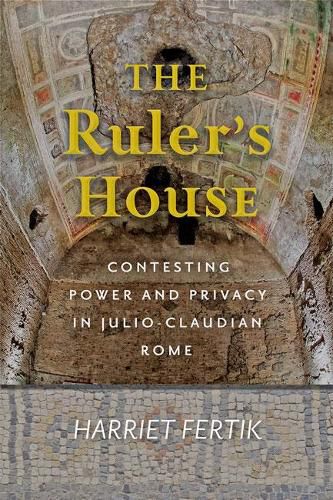Readings Newsletter
Become a Readings Member to make your shopping experience even easier.
Sign in or sign up for free!
You’re not far away from qualifying for FREE standard shipping within Australia
You’ve qualified for FREE standard shipping within Australia
The cart is loading…






How Romans used the world of the house to interpret and interrogate the role of the emperor.
The Julio-Claudian dynasty, beginning with the rise of Augustus in the late first century BCE and ending with the death of Nero in 68 CE, was the first ruling family of the Roman Empire. Elite Romans had always used domestic space to assert and promote their authority, but what was different about the emperor’s house? In The Ruler’s House, Harriet Fertik considers how the emperor’s household and the space he called home shaped Roman conceptions of power and one-man rule.
While previous studies of power and privacy in Julio-Claudian Rome have emphasized the emperor’s intrusions into the private lives of his fellow elites, this book focuses on Roman ideas of the ruler’s lack of privacy. Fertik argues that houses were spaces that Romans used to contest power and to confront the contingency of their own and others’ claims to rule. Describing how the Julio-Claudian period provoked anxieties not only about the ruler’s power but also about his vulnerability, she reveals that the ruler’s house offered a point of entry for reflecting on the interdependence and intimacy of ruler and ruled.
Fertik explores the world of the Roman house, from family bonds and elite self-display to bodily functions and relations between masters and slaves. She draws on a wide range of sources, including epic and tragedy, historiography and philosophy, and art and architecture, and she investigates shared conceptions of power in elite literature and everyday life in Roman Pompeii. Examining political culture and thought in early imperial Rome, The Ruler’s House confronts the fragility of one-man rule.
$9.00 standard shipping within Australia
FREE standard shipping within Australia for orders over $100.00
Express & International shipping calculated at checkout
How Romans used the world of the house to interpret and interrogate the role of the emperor.
The Julio-Claudian dynasty, beginning with the rise of Augustus in the late first century BCE and ending with the death of Nero in 68 CE, was the first ruling family of the Roman Empire. Elite Romans had always used domestic space to assert and promote their authority, but what was different about the emperor’s house? In The Ruler’s House, Harriet Fertik considers how the emperor’s household and the space he called home shaped Roman conceptions of power and one-man rule.
While previous studies of power and privacy in Julio-Claudian Rome have emphasized the emperor’s intrusions into the private lives of his fellow elites, this book focuses on Roman ideas of the ruler’s lack of privacy. Fertik argues that houses were spaces that Romans used to contest power and to confront the contingency of their own and others’ claims to rule. Describing how the Julio-Claudian period provoked anxieties not only about the ruler’s power but also about his vulnerability, she reveals that the ruler’s house offered a point of entry for reflecting on the interdependence and intimacy of ruler and ruled.
Fertik explores the world of the Roman house, from family bonds and elite self-display to bodily functions and relations between masters and slaves. She draws on a wide range of sources, including epic and tragedy, historiography and philosophy, and art and architecture, and she investigates shared conceptions of power in elite literature and everyday life in Roman Pompeii. Examining political culture and thought in early imperial Rome, The Ruler’s House confronts the fragility of one-man rule.